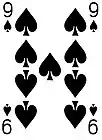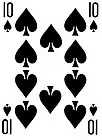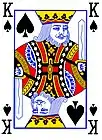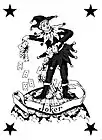king
English

.jpg.webp)
Pronunciation
- enPR: kĭng, IPA(key): /kɪŋ/
- (US, pre-/ŋ/ tensing), IPA(key): /kiŋ/
Audio (US) (file) Audio (UK) (file) - Rhymes: -ɪŋ
Etymology 1
From Middle English king, kyng, from Old English cyng, cyning (“king”), from Proto-Germanic *kuningaz, *kunungaz (“king”), equivalent to kin + -ing. Cognate with Scots king (“king”), North Frisian köning (“king”), West Frisian kening (“king”), Dutch koning (“king”), Low German Koning, Köning (“king”), German König (“king”), Danish konge (“king”), Norwegian konge, Swedish konung, kung (“king”), Icelandic konungur, kóngur (“king”), Finnish kuningas (“king”), Russian князь (knjazʹ, “prince”), княги́ня (knjagínja, “princess”).
Noun
king (plural kings)
- A male monarch; a man who heads a monarchy. If it's an absolute monarchy, then he is the supreme ruler of his nation.
- Henry VIII was the king of England from 1509 to 1547.
- A powerful or majorly influential person.
- Howard Stern styled himself as the "king of all media".
- 1907, Robert William Chambers, chapter I, in The Younger Set, New York, N.Y.: D. Appleton & Company, OCLC 24962326:
- "I wish we were back in Tenth Street. But so many children came […] and the Tenth Street house wasn't half big enough; and a dreadful speculative builder built this house and persuaded Austin to buy it. Oh, dear, and here we are among the rich and great; and the steel kings and copper kings and oil kings and their heirs and dauphins. […]"
- 2014 June 21, “Magician’s brain”, in The Economist, volume 411, number 8892:
- The truth is that [Isaac] Newton was very much a product of his time. The colossus of science was not the first king of reason, Keynes wrote after reading Newton’s unpublished manuscripts. Instead “he was the last of the magicians”.
- Something that has a preeminent position.
- In times of financial panic, cash is king.
- 2012 June 3, Nathan Rabin, “TV: Review: THE SIMPSONS (CLASSIC): “Mr. Plow” (season 4, episode 9; originally aired 11/19/1992)”, in (Please provide the book title or journal name):
- It would be difficult, for example, to imagine a bigger, more obvious subject for comedy than the laughable self-delusion of washed-up celebrities, especially if the washed-up celebrity in question is Adam West, a camp icon who can go toe to toe with William Shatner as the king of winking self-parody.
- A component of certain games.
- (chess) The principal chess piece, that players seek to threaten with unavoidable capture to result in a victory by checkmate. It is often the tallest piece, with a symbolic crown with a cross at the top.
- (card games) A playing card with the letter "K" and the image of a king on it, the thirteenth card in a given suit.
- A checker (a piece of checkers/draughts) that reached the farthest row forward, thus becoming crowned (either by turning it upside-down, or by stacking another checker on it) and gaining more freedom of movement.
- (Britain, slang) A king skin.
- Oi mate, have you got kings?
- A male dragonfly; a drake.
- A king-sized bed.
- 2002, Scott W. Donkin, Gerard Meyer, Peak Performance: Body and Mind (page 119)
- Try asking for a king-size bed next time because kings are usually firmer.
- 2002, Scott W. Donkin, Gerard Meyer, Peak Performance: Body and Mind (page 119)
Coordinate terms
Derived terms
- a cat may look at a king
- California king
- Charlton Kings
- chicken à la King
- drag king
- dragonking
- every king needs a queen
- fit for a king
- foreking
- god-king
- God Save the King
- Good King Henry
- Homecoming King
- in the land of the blind, the one-eyed man is king
- Kingian
- King and Queen County
- King and Queen Court House
- King Arthur
- King Billy
- king brown
- king cab
- king cake
- king card
- King Charles Land
- King Charles's head
- King Charles spaniel
- king cobra
- King Cotton
- King's Counsel
- king-count
- King Country
- king crab
- King David's harp
- kingdom
- king eider
- King's English
- king's evil
- King George
- King George County
- King George whiting
- king-hell
- king hit
- kinghood
- King James Bible
- King James Version
- king's knight's pawn
- King Kong
- kinglet
- King Mob
- king-of-arms
- king of beasts
- king of clubs
- king of diamonds
- King of Glory
- king of hearts
- king of herrings
- king of insects
- King of Kings
- King of Patriarchs
- king of six
- king of spades
- king of the doos
- king of the hill
- king oyster mushroom
- king pair
- king parrot
- king's pawn
- king penguin
- king post
- king's ransom
- king's rook's pawn
- King Salmon
- Kings County
- kingship
- King Shit of Turd Island
- kingside
- king-sized
- king skin
- King's Lynn
- kingslayer
- Kingstree
- king tide
- king vulture
- King William
- King William County
- make-king
- pearly king
- philosopher king
- priest-king
- prom king
- rat king
- rice king
- sea king
- sofa king
- suicide king
Translations
|
|
|
|
|
|
- The translations below need to be checked and inserted above into the appropriate translation tables, removing any numbers. Numbers do not necessarily match those in definitions. See instructions at Wiktionary:Entry layout#Translations.
See also
| Chess pieces in English · chess pieces, chessmen (see also: chess) (layout · text) | |||||
|---|---|---|---|---|---|
| king | queen | castle, rook | bishop | knight | pawn |
| Playing cards in English · playing cards (layout · text) | ||||||
|---|---|---|---|---|---|---|
| ace | deuce, two | three | four | five | six | seven |
 |
 |
 |
 |
 |
 |
 |
| eight | nine | ten | jack, knave | queen | king | joker |
| Suits in English · suits (see also: cards, playing cards) (layout · text) | |||
|---|---|---|---|
| hearts ♥ | diamonds ♦ | spades ♠ | clubs ♣ |
Verb
king (third-person singular simple present kings, present participle kinging, simple past and past participle kinged)
- To crown king, to make (a person) king.
- 1982, South Atlantic Modern Language Association, South Atlantic Review, Volume 47, page 16,
- The kinging of Macbeth is the business of the first part of the play […] .
- 2008, William Shakespeare, A. R. Braunmuller (editor), Macbeth, Introduction, page 24,
- One narrative is the kinging and unkinging of Macbeth; the other narrative is the attack on Banquo's line and that line's eventual accession and supposed Jacobean survival through Malcolm's successful counter-attack on Macbeth.
- 1982, South Atlantic Modern Language Association, South Atlantic Review, Volume 47, page 16,
- To rule over as king.
- c. 1599, William Shakespeare, The Life of Henry the Fifth, Act 2, Scene 4,
- And let us do it with no show of fear; / No, with no more than if we heard that England / Were busied with a Whitsun morris-dance; / For, my good liege, she is so idly king’d, / Her sceptre so fantastically borne / By a vain, giddy, shallow, humorous youth, / That fear attends her not.
- c. 1599, William Shakespeare, The Life of Henry the Fifth, Act 2, Scene 4,
- To perform the duties of a king.
- 1918, Brotherhood of Railroad Trainmen, The Railroad Trainman, Volume 35, page 675,
- He had to do all his kinging after supper, which left him no time for roystering with the nobility and certain others.
- 2001, Chip R. Bell, Managers as Mentors: Building Partnerships for Learning, page 6,
- Second, Mentor (the old man) combined the wisdom of experience with the sensitivity of a fawn in his attempts to convey kinging skills to young Telemachus.
- 1918, Brotherhood of Railroad Trainmen, The Railroad Trainman, Volume 35, page 675,
- To assume or pretend preeminence (over); to lord it over.
- 1917, Edna Ferber, Fanny Herself, page 32,
- The seating arrangement of the temple was the Almanach de Gotha of Congregation Emanu-el. Old Ben Reitman, patriarch among the Jewish settlers of Winnebago, who had come over an immigrant youth, and who now owned hundreds of rich farm acres, besides houses, mills and banks, kinged it from the front seat of the center section.
- 1917, Edna Ferber, Fanny Herself, page 32,
- To promote a piece of draughts/checkers that has traversed the board to the opposite side, that piece subsequently being permitted to move backwards as well as forwards.
- 1957, Bertram Vivian Bowden (editor), Faster Than Thought: A Symposium on Digital Computing Machines, page 302,
- If the machine does this, it will lose only one point, and as it is not looking far enough ahead, it cannot see that it has not prevented its opponent from kinging but only postponed the evil day.
- 1986, Rick DeMarinis, The Burning Women of Far Cry, page 100,
- I was about to make a move that would corner a piece that she was trying to get kinged, but I slid my checker back […] .
- 1957, Bertram Vivian Bowden (editor), Faster Than Thought: A Symposium on Digital Computing Machines, page 302,
- To dress and perform as a drag king.
- 2008, Audrey Yue, King Victoria: Asian Drag Kings, Postcolonial Female Masculinity, and Hybrid Sexuality in Australia, in Fran Martin, Peter Jackson, Audrey Yue, Mark McLelland (editors), AsiaPacifQueer: Rethinking Genders and Sexualities, page 266,
- Through the ex-centric diaspora, kinging in postcolonial Australia has become a site of critical hybridity where diasporic female masculinities have emerged through the contestations of "home" and "host" cultures.
- 2008, Audrey Yue, King Victoria: Asian Drag Kings, Postcolonial Female Masculinity, and Hybrid Sexuality in Australia, in Fran Martin, Peter Jackson, Audrey Yue, Mark McLelland (editors), AsiaPacifQueer: Rethinking Genders and Sexualities, page 266,
Translations
Estonian
Etymology
From Proto-Finnic *kenkä. Cognate with Finnish kenkä.
Declension
| singular | plural | |
|---|---|---|
| nominative | king | kingad |
| genitive | kinga | kingade |
| partitive | kinga | kingi / kingasid |
| illative | kinga / kingasse | kingadesse / kingisse |
| inessive | kingas | kingades / kingis |
| elative | kingast | kingadest / kingist |
| allative | kingale | kingadele / kingile |
| adessive | kingal | kingadel / kingil |
| ablative | kingalt | kingadelt / kingilt |
| translative | kingaks | kingadeks / kingiks |
| terminative | kingani | kingadeni |
| essive | kingana | kingadena |
| abessive | kingata | kingadeta |
| comitative | kingaga | kingadega |
Quotations
Kapampangan
Manx
Etymology
From Old Irish ceinn, cinn, genitive singular and nominative plural, respectively, of cenn (“head”).
Middle English
Alternative forms
Etymology
Inherited from the Old English cyning. The forms kug (attested in the compounds kugdom, kuglond, and kugriche) and gug (attested in the compound guglond) show the influence of the Old Norse konungr, whence they borrow their root vowel. The early forms featuring syncope (chinge, chinȝ, cing, and cinȝ) may have long ī.
